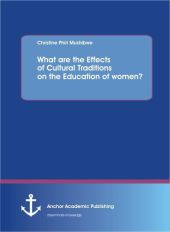 Neuerscheinungen 2013Stand: 2020-01-07 |
Schnellsuche
ISBN/Stichwort/Autor
|
Herderstraße 10
10625 Berlin
Tel.: 030 315 714 16
Fax 030 315 714 14
info@buchspektrum.de |

Christine Phiri Mushibwe
What are the Effects of Cultural Traditions on the Education of women? (The Study of the Tumbuka People of Zambia)
1st ed. 2013. 392 p. w. 23 figs. 22,5 cm
Verlag/Jahr: ANCHOR ACADEMIC PUBLISHING 2013
ISBN: 3-9548909-7-6 (3954890976)
Neue ISBN: 978-3-9548909-7-2 (9783954890972)
Preis und Lieferzeit: Bitte klicken
Cultural traditions do adversely affect the education of many people in the world. Women are, unfortunately, the most affected victims of their culture.
This book demonstrates how cultural traditions can militate against the education of women in Zambia with a focus on the Tumbuka tribe.
The evidence at hand demonstrates that patrilineal groupings are strongholds of the patriarchal predisposition and patriarchal attitudes and cultural traditions do not recognize women as equal partners with men. The Tumbuka women´s experiences and beliefs reflect socio-cultural traditional norms that tend to limit gender equality, and compel women to accept and justify male domination at the expense of their own status and to regard consequent inequalities as normal. Evidence demonstrates that the initiation rites, an active institution for girls of pubescent age, interfere more with the school-based education of girls. The women are active social agents as well as passive learners who will not allow the girls they are coaching to question the purpose for some traditional practices that are oppressive and directly cause them to fail to complete their schooling successfully.
The neglected education of my fellow women is the grand source of the misery I deplore.´ (Mary Wollstonecraft).With a PhD in Education whose focus was on the education of women, the author seeks to continue writing on the education of women. The author comes from a similar ethnic grouping, in some ways, as the Tumbukas, but was lucky to have an educated father who gave her a chance to get educated and who supports her until today.As a secondary school teacher, the author served as a national chairperson for the Home Economics Association of Zambia for 3 years. During that time she travelled the country and came across more and more evidence of how much girls were deprived of the empowerment that comes along with education, because of traditions that restricted, or stopped them altogether from attending school.


